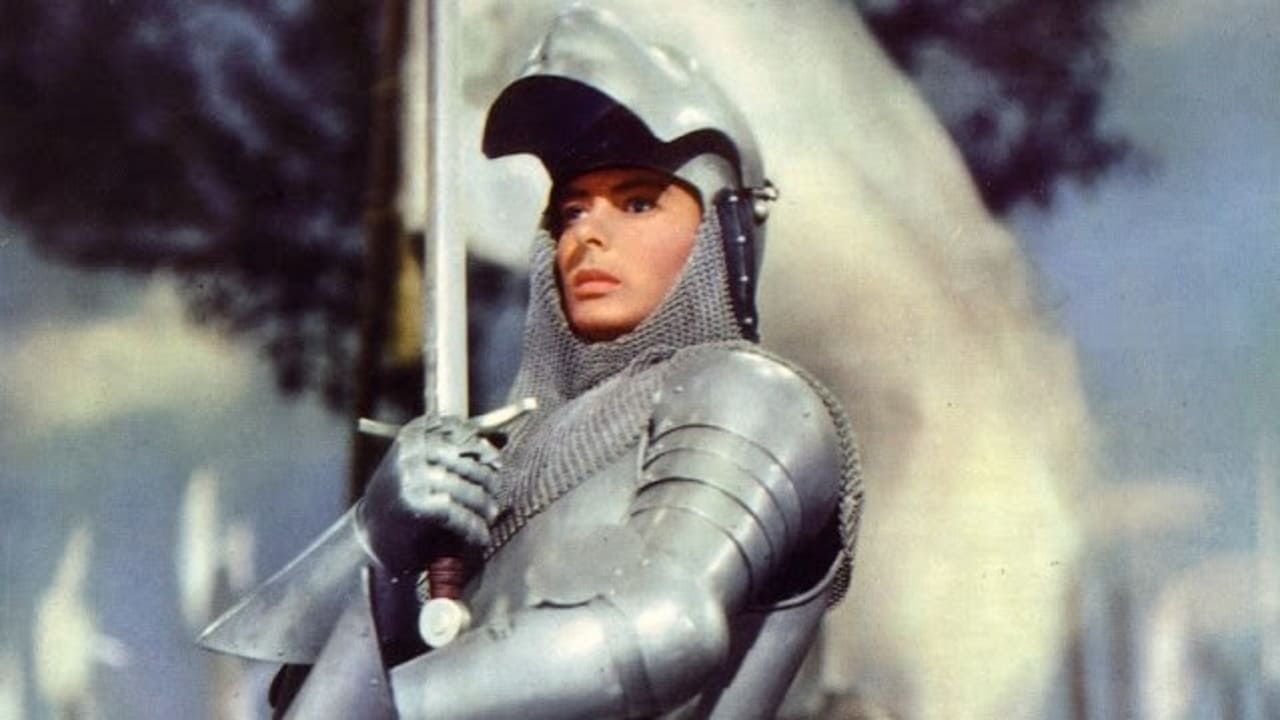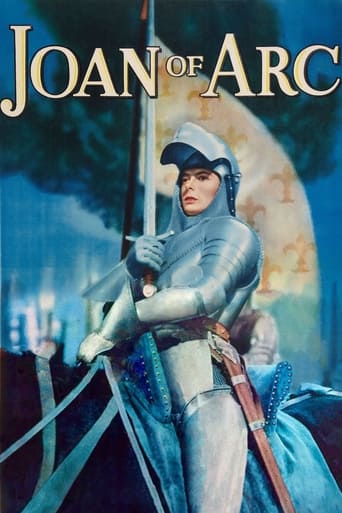BlazeLime
Strong and Moving!
Titreenp
SERIOUSLY. This is what the crap Hollywood still puts out?
Keeley Coleman
The thing I enjoyed most about the film is the fact that it doesn't shy away from being a super-sized-cliche;
Abegail Noëlle
While it is a pity that the story wasn't told with more visual finesse, this is trivial compared to our real-world problems. It takes a good movie to put that into perspective.
wes-connors
Bathed in colorful cinematography, pretty little Ingrid Bergman (as Jeanne d'Arc aka "Joan of Arc") looks divine in a 15th century French church. Her farming family frets about Ms. Bergman's preoccupation with prayer. However, Bergman has a more direct line to God than anyone knows. Inspired by her savior Jesus Christ, Bergman decides to go to fight the British occupiers of France. She also sets out to ensure God's chosen man is crowned King. People tell Bergman it is impossible, but she insists, "I must save France!" To enlist, Bergman disguises herself as a young lad. With a busty figure, make-up and cute new French haircut, the actress simply does not look like a boyish teenager. The miscasting could have been successfully addressed by sticking with the original stage version's "play within a play" format. It was about a troupe of actors dramatizing the heroine's life. The stage format allows more leeway in casting...The last film directed by Victor Fleming, "Joan of Arc" was elevated far above its worth by "Academy Awards" voters. It won three Oscars and was nominated for five more, including a notable one for supporting actor Jose Ferrer (as the Dauphin aka Charles) in his film debut. Unsatisfied by all the attention, producer Walter Wanger refused to accept his special award because the film failed to be nominated in the "Best Picture" category. "Joan of Arc" has been restored to its original epic length, which turns out to be a mixed blessing.**** Joan of Arc (11/11/48) Victor Fleming ~ Ingrid Bergman, Jose Ferrer, Francis L. Sullivan, J. Carrol Naish
Steffi_P
In our era there are women warriors in film and TV, from Xena to Beatrix Kiddo, but back in Hollywood's classic era they were an extreme rarity. Joan of Arc was an exception that was acceptable partly because she came from history not fiction and, more crucially, she was a saint and a miracle worker. The tale was told in the only way it could be then, as one of the religious epics that would become a major presence in the cinema of the following decade.Appearing a few years before the epic genre really took off, and while studios were still recovering from the lowered budgets of WW2, Joan of Arc is not quite as grandiose as the biblical movies that would come later on. Based on a play (Maxwell Anderson's Joan of Lorraine), upon its release it was accused of being too talky and lacking in action. But this is made up for in a number of ways, not least of which is its lavish period detail. It is epic in scope and scale, but only so far as the history requires. There is no spectacle for spectacle's sake. The movie is exactly as big and spectacular as it needs to be.The movie is also buoyed by a leading performance from Ingrid Bergman. Bergman brings a necessary presence to the role, not in her delivery of lines but in the power of her emoting, which transcends any stolidness in the screenplay. An especially notable moment is her look of genuine disappointment when she realises that the dauphin has been replaced by one of his lackeys. The other standout performance is that of José Ferrer as the real dauphin. Fresh from the stage, Ferrer is theatrical, Shakespearean even, but that is just the sort of exuberant touch the movie needs to stop it becoming staid.This was the final project of ace director Victor Fleming, who had earlier helmed (most of) Gone with the Wind and The Wizard of Oz. Joan of Arc sees him taking a more relaxed pace (his trademark was speed and punchiness), but with no less of an eye for intelligent staging and shot composition. There's an excellent scene where a young Joan wanders distractedly away from the chattering of her family to sit alone by the fire, framed in profile with the flames forming a corona about her head. This isn't just some obscure bit of symbolism or foreshadowing, it's a way of showing her in clear isolation while still keeping her image dynamic and vibrant.The presentation and performance of this edition of the Joan of Arc story compensates for its dramatic, dialogue-based format. And, while it remains very much a movie based on Joan's sainthood and Christian devotion, Bergman makes her touchingly human, and this allows the character to reach us from the past.
Claudio Carvalho
In the Fifteenth Century, France is a defeated and ruined nation after the One Hundred Years War against England. The fourteen years old farm girl Joan of Arc (Ingrid Bergman) claims to hear voices from Heaven asking her to lead God's Army against Orleans and crowning the weak Dauphin Charles VII (José Ferrer) as King of France. Joan gathers the people with her faith, forms an army and conquerors Orleans. When her army is ready to attack Paris, the corrupt Charles sells his country to England and dismiss the army. Joan is arrested, sold to the Burgundians England and submitted to a shameful political trial in Rouen castle, when in 1931 she is sentenced to burn at stake.The story of Joan D'Arc is one of the most beautiful I have seen in the cinema, and Victor Fleming's version is no exception. I have seen Carl Dryer's and Robert Bresson's (the best), Luc Besson's (the weakest – actually a means to promote his girlfriend Mila Jovovich), Christian Duguay's (a great television version with Leelee Sobieski in the lead role) and all of them a good movies because the story of this martyr and saint "Maid of Lorraine" is actually awesome and doomed to please the audiences. Her history shows faith, betrayal and corruption in a period of treachery and domination of the powerful Catholic Church in Europe. Ingrid Bergman is miscast in the role of a fourteen to nineteen years old girl that can be confused with a man, but she has a great and shining performance and deserved her nomination to the Oscar. The debut of José Ferrer could not be better, performing a shallow and corrupt king. The Oscar winning cinematography is very beautiful for a 1948 movie. The DVD released in Brazil is completely restored but unfortunately there is a bug in chapter 6, stopping the movie. My vote is nine.Title (Brazil): "Joana D'Arc" ("Joan of Arc")
sendraguy
After what seems like gargantuan efforts to obtain the DVD and the necessary equipment I have finally managed to see the uncut version of Joan of Arc.I am thrilled with this new DVD and will add nothing further to the positive comments that have already been made. However I should like to pay particular tribute to the wonderful music of Hugo Friedhofer. Of course, for years I loved his score for 'The best years of your life' but in terms of writing for an earlier period I never regarded this composer is quite the same league as, say, William Walton, whose Shakespeare/ Olivier scores were so memorable. But I have been forced to revise my opinion.It was Max Reger who commented to the English composer Vaughan Williams: 'you have a veritable obsession with the flattened seventh' Well so, it seems does Mr Friedhofer! I suppose one either likes or loathes pastiche and modal writing. I adore it, and think that in Joan of Arc we get the best of both worlds. The music has a direct and powerful emotional appeal. It could scarcely fail to have. Yet given the fact that Friedhofer uses C20th conventions, harmonies, instruments and musicians, his 'nods' in the direction of C15th French church music are tastefully enough done for us to feel that such scenes as the coronation are, if not exactly in any sense 'authentic' then still marvellously effective.I should dearly love to know whether anyone has arranged the score into a suite of pieces and recorded it. That would be a rare treat. Perhaps some other readers can advise?

